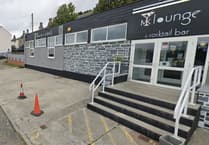Cash from the cancelled northern leg of HS2 redirected to fix Devon’s roads will not be enough to repair all the county’s potholes, it has emerged.
Devon County Council (DCC) received an additional £6.66 million for highway maintenance following the cancellation of the HS2 high-speed rail line extension to Manchester.
But the amount is insufficient because according to DCC’s own estimates, £167 million will be needed to repair all of Devon’s damaged roads, including the potholes.
South Hams District Council leader Julian Brazil believed the figure could be even higher and told this paper that it was “a staggering amount of money”.
He said: “There’s absolutely no way we’re going to get it. I’m afraid we’re almost doing a sort of managed decline with the state of our roads. They’ve been in decline for decades and there’s never enough money.”
In addition to the HS2 funding, DCC received £9.39 million towards what is known as the ‘potholes fund’, but the money is also being spent on other road-related issues as it is not ring-fenced.
A DCC spokesperson told this paper the local authorities were being encouraged to use the funding “to address priorities”.
He said: “In Devon, this means that the funding is directed to addressing highway issues to prevent the formation of potholes. This includes patching repairs, road resurfacing schemes and other surface treatments.”
The local authority has spent £7.8 million this financial year repairing more than 200 kilometres of the county’s roads.
The money came from DCC revenue rather than the government’s potholes fund, but DCC’s capital expenditure on highway maintenance is also set to drop during 2024/2025.
The parlous state of Devon’s roads is reflected throughout the rest of the country. A report released last month by the Asphalt Industry Alliance revealed that roads in England and Wales were at “breaking point” due to potholes.
The Annual Local Authority Road Maintenance (ALARM) survey showed that despite the boost in road funding the scale of the challenge is huge as only 47 per cent of local roads are in good structural condition.
The report revealed that more than 107,000 miles – equivalent to 53 per cent of the network – has been classified as having less than 15 years’ structural life remaining, adding that the cost of tackling the backlog of carriageway repairs has risen to a new record high of £16.3 billion.
Roads minister Guy Opperman boasted that the HS2 amount (£8.3 billion spread out over 11 years) was not only the “biggest-ever funding increase” but that it was enough to resurface 5,000 miles of roads across the country.
However, the report pointed out that resurfacing 5,000 miles of local roads over the next decade or so would equate to just 2.5 per cent of the local road network, adding that funding had seen a cut in real terms due to inflation.
This despite the fact that two million potholes were filled over the past year – up more than 40 per cent compared to the previous year.




